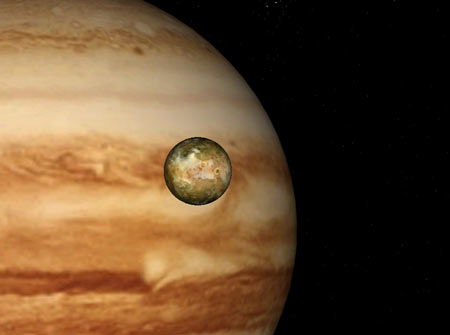Jupiter 'kidnaps' comets
60 years ago, Jupiter used to force a comet to fly around it with tremendous attraction. This reluctant satellite only obeys the giant for 12 years and escapes.
National Geographic recently stated that in 1949 Jupiter pulled a comet named 147P / Kushida-Muramatsu into its orbit. As a result, comets about 400 meters in diameter flew around Jupiter until 1969. Katsuhito Ohtsuka, a scientist from Tokyo Meteor Network, and his colleagues found this phenomenon. The team used calculations from 1993 to determine the comet's journey.
' We can confirm that comet 147P / Kushida-Muramatsu revolved around Jupiter once or twice before escaping its attraction ,' said David Asher, an Armagh Observatory (UK) expert. expression.

Jupiter and its satellite.(Photo: free-review.net)
Until now astronomers have only discovered a temporary satellite of Jupiter destroyed by its gravity. In 1994, Shoemaker-Levy 9 comet broke into pieces and fell to Jupiter. One has just observed a huge column of dust and smoke on this planet last July. Asher thinks it could be the result of a collision with a comet or meteorite.
Unlike Shoemaker-Levy 9, 147P / Kushida-Muramatsu comet, Kushida-Muramatsu has escaped the attraction of Jupiter. It is currently revolving around the sun and joining the meteorite belt of the Solar System. This belt lies between the orbit of Mars and Jupiter.
But Kushida-Muramatsu is not the last temporary satellite of the largest planet in the solar system. Astronomers believe that, between 2068 and 2086, the 111P / Helin-Roman-Crockett comet will likely be kidnapped by Jupiter and become its temporary satellite. This comet will move around Jupiter 6 rounds before escaping.
Many argue that the earth's gravitational pull is strong enough to turn a comet or meteorite into a temporary satellite .
' There is much evidence that some small objects in the universe are attracted to the globe, but then they escape. Therefore, theoretically our planet may have a temporary satellite , "Asher said.
However, large objects can cause disaster if they fall to the earth. Fortunately, this dark scenario is very unlikely, because large comets or asteroids are always drawn towards Jupiter. Thus, we can say that Jupiter is one of the celestial objects that protect the civilization of the earth from destruction.

- Overview of Jupiter
- Extremely special comets will appear in 2013
- Mysterious objects crash into Jupiter
- In 2014, comets attacked Mars
- For the first time, humans can discover Jupiter's deepest mystery
- The Juno probe sends the first image of Jupiter to Earth
- What happens if Jupiter doesn't exist?
- Comet - the mystery of the universe
- The list of 5 points can be answered on comets
- Li explained the destruction of comets
- Tonight is the best time to see Jupiter
- Jupiter and Saturn will shine beautifully in the sky from today
 Van Allen's belt and evidence that the Apollo 11 mission to the Moon was myth
Van Allen's belt and evidence that the Apollo 11 mission to the Moon was myth The levels of civilization in the universe (Kardashev scale)
The levels of civilization in the universe (Kardashev scale) Today Mars, the sun and the Earth are aligned
Today Mars, the sun and the Earth are aligned The Amazon owner announced a secret plan to build a space base for thousands of people
The Amazon owner announced a secret plan to build a space base for thousands of people